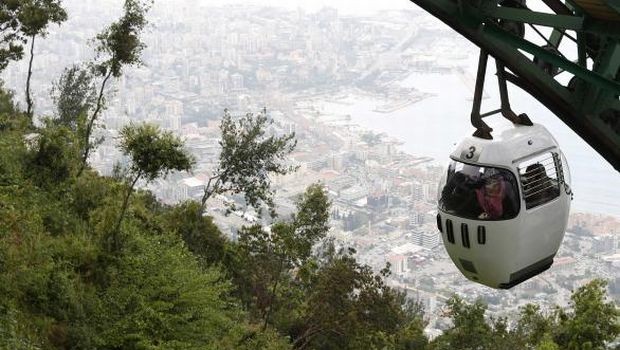
Tourists sit in a cable car from Harisa into Jounieh in northern Beirut on April 18, 2013. (REUTERS/Jamal Saidi)
Lebanese and Syrian politics have been historically intertwined, especially since the beginning of the Lebanese Civil War in the mid-1970s. While it is unsurprising that Lebanese politics have been affected by the Syrian uprisings, even the crown jewel of Lebanon’s economy, its tourism sector, has suffered from the conflict. Tourists are simply not as eager to visit Lebanon as they used to be, and revenue from tourism has decreased significantly since the fighting began.
Recently, Lebanese minister of tourism Fadi Abboud told Asharq Al-Awsat that “any security and instability, whether real or exaggerated on television, is directly linked to the tourism sector. This results in tourists becoming afraid to visit Lebanon.”
The World Travel & Tourism Council projected a 2.1% decrease in tourism’s direct contribution to the Lebanese economy, according to the Lebanese Daily Star.
Economic indicators corroborate the general impression that the civil war in Syria is affecting Lebanon’s tourism sector. The first few months of 2012 showed a drop of almost 40% in tourism in comparison to previous years due to the worsening situation in Syria and the bombing that took place in the busy Achrafieh region in October. In addition to this, Ernst & Young estimated an 84% decrease in foreign direct investment.
According to a recent article published in this newspaper in Arabic, the number of tourists entering Lebanon by motor vehicle across the border—usually from the Gulf—has decreased significantly due to the grave security situation in Syrian territory. Middle East Airlines, Lebanon’s national air carrier, is currently trying to compensate for the fall in visitors entering the country by car via price reductions and offers. Further complicating the matter is the fact that the GCC and other governments in the region are advising their citizens not to visit Lebanon due to the security situation, especially after the occurrence of many highly publicized kidnappings.
It is mainly tourism by foreigners that is falling. Their preferred activities include visiting museums; historical, religious and archaeological sites; and going on nature excursions. All of these have seen decreased income over the past two years. Luxury hotels have seen a decrease in guests; they are resorting to dismissing employees and restricting energy use to reduce costs and providing cheap offers and packages to attract tourists. It has been estimated by The World Travel & Tourism Council sources that hotel occupancy rate fell by almost 30% during the beginning of 2013.
Prospects for Lebanon’s tourism industry are not all grim, however. The United Nations World Tourism Organization and the Academy for Excellence Awards recently named the ancient city of Byblos as the best tourism destination in the Arab world, which is expected to increase interest in the small Mediterranean nation. The country’s Ministry of Tourism is also stepping up efforts to attract foreign tourists: for example, it is launching its “Taste Lebanon” campaign in conjunction with a UK-based company that organizes culinary tours.
Additionally, financially comfortable Syrian refugees, mainly from Aleppo, Homs and Damascus, are renting furnished apartments, creating an increased demand for such accommodation.
Residents of Lebanon have become highly accustomed to leisurely living regardless of looming conflict, and play a vital role in maintaining the tourism in the country. Tourism by locals and Lebanese emigrants returning to the country has remained mostly stable, particularly in Beirut. Restaurants, pubs, and nightclubs in the capital are buzzing and seem unaffected by the commotion, bolstered by the recent Easter holiday and the upcoming high season.
Beirut is known as one of the shopping capitals of the Middle East, and several new developments may prompt visitors to come to the country. The Dubai-based holding company Majid Al-Futtaim invested approximately USD 350 million in Beirut’s City Center shopping mall, which hosts more than 200 specialty stores, including European flagship supermarkets Carrefour and Marks & Spencer. A local investment project by ABC and Verdun 1544 Holdings, part of the Bahaa Rafic Hariri Group, financed the launch of the ABC Verdun shopping mall, a USD 200 million development expected to be completed by 2017.
Tourism minister Faddi Abboud recently told Reuters that Lebanon is expecting up to two million tourists this year, and all indications point to a tourism boom this summer.
In particular, his ministry is expecting tourists from the Gulf to begin visiting again. This newspaper previously reported that tourism from the Gulf dropped 80% in 2012. Gulf visitors are expected to return largely due to an improved perception of the security situation in Lebanon, but the country’s tourism sector has also been marketing itself aggressively in the region with attractive offers and discounts.
“We consider our relationship with the Gulf states a historical one,” Abboud said to Asharq Al-Awsat, “and we hope all political reasons that lead to boycotting Lebanon have disappeared.”
President Michel Suleiman asked newly appointed Prime Minister Tammam Salam to promote the tourism sector, as part of a wider strategy to change both foreign and domestic perceptions of Lebanon for the better.
A representative from the Lebanese ministry of tourism concluded: “We are optimistic about the future, but without the Lebanese people the tourism in Lebanon would have been much worse. It is inevitable that the conflicts in neighboring Syria affect the region as a whole, and only when this conflict ends can the two countries thrive to their potential together.”
